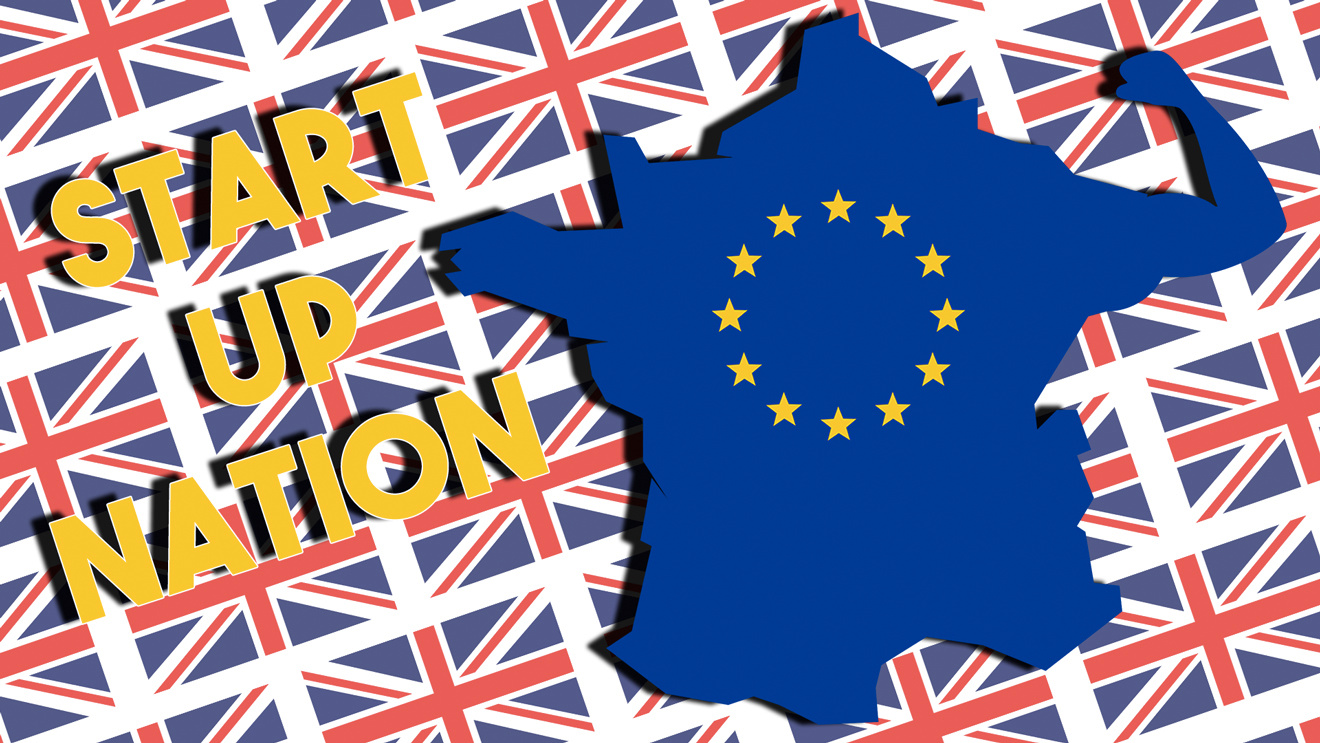Ever since a 52% majority of British voters decided their country should severe its economic and institutional ties with mainland Europe, the United Kingdom has been going through a fair amount of turmoil. Much of the chaos was quite foreseeable as of June 23rd, 2016: Leave campaigners themselves acknowledge they knew the national political landscape would be shaken after voting in favour of a proposal the Prime Minister had fought against for over a year. A period of governmental uncertainty was nothing short of inevitable.
What was perhaps less easily perceptible to the average Leave voter was the potential damage Brexit would do to the British economy – more specifically, to the smallest and as such most vulnerable, but also most innovative actors in the economy the modern world has learnt to know as start-ups. During a campaign marred by factual lies and impossible promises of £350-million-a-week NHS funding, it appears many people’s judgments may have been impaired. The risks of quitting the European Union for the booming UK tech sector, for instance, were a seemingly necessary piece of information to make an informed decision – one a majority of voters knew either very little or nothing about.
Concerns with Brexit ranging from venture capital funding to immigration policy
One of many worried young British entrepreneurs, Samantha Payne, cofounder of robotics start-up Open Bionics, notes in a Financial Times interview that “the entire robotics ecosystem in the UK relies on European funding to test and develop new technology”. The scope of the uncertainty induced by Brexit is probably best reflected when she adds: “I have not seen this funding offered by this government yet”. The game changer here is venture capital investment, which plays a vital part in the British start-up system by financing tiny tech businesses larger investors wouldn’t even look at. Problem: the European Investment Fund (EIF), an EU-built financial institution, is bound to freeze the £900 million it invests into UK venture capital funds each year, thus financially suffocating many players in the industry. Emphasising Ms Payne’s point is Episode 1 Ventures managing partner Simon Murdoch, a venture capitalist, who confesses to Business Insider that “the British Business Bank, the obvious alternative to the EIF, is severely under-resourced”.
So it appears that the whole UK start-up ecosystem is at stake, and yet businesses have absolutely no idea about how the leaving process will unfold – for instance, which EU subsidies will be compensated by future government grants and which will not. Such an unstable environment can only lead to two outcomes for start-ups: either remaining indecisive (refraining from investing much in new projects for fear of seeing vital subsidies disappear, etc.), or leaving the country altogether. And any consultant would warn that being deprived of an ambitious investment strategy is a death warrant in the aggressive tech start-up market.
But money is only a fraction of the problem. Another abrasive issue is immigration, doubtless the most debated-upon topic over the course of the Brexit campaign. Admittedly, the qualified foreign workers British tech start-ups need so badly to expand rarely need to pitch camp in muddy terrain in the outskirts of Calais, contrary to many refugees David Cameron once referred to as a “bunch of migrants”. But one concern unites all immigrants: potentially needing a visa to live in the country after the UK officially parts from the EU. A leaked Home Office document obtained by The Guardian in September 2017 suggests an exceptionally tough immigration policy after Brexit is enacted, that would put “Britain first” and under which EU nationals would be subject to the same visa procedures and limitations as those already imposed on non-EU immigrants.
Such a tough stance could be especially frightening to an industry that relies as much on blending the world’s talents as the tech start-up sector: a study led by the Global Entrepreneurship Monitor (GEM) has shown by polling over 10,000 UK adults in 2015 that immigrants are three times as likely to launch a start-up as British-born residents. 15.4% of foreign-born individuals stated they had set up their own company in the country or planned to do so in months to come, compared to 5.3% of native Britons. Another report by the Centre for Entrepreneurs, eloquently titled Migrant Entrepreneurs: Building our Businesses, Creating our Jobs, states that one in seven British companies is either founded or co-founded by a migrant entrepreneur. The figures are staggering: 456,000 foreign businessmen from 155 different nationalities are directly responsible for an estimated 1.16 million jobs within the United Kingdom. Add to this portrait that Britain has a perceived skills shortage in the data and tech industry – according to The Independent, foreign IT experts earn 18% more than native digital engineering graduates – and one starts to fathom the extent of the damage Brexit could do to UK start-ups.
So it becomes quite clear that the local tech sector will suffer from Brexit in one way or another. What remains to be precisely determined is the scope of the blow: doing so will only be possible once the practical terms of the split-up are officially announced. In that respect, knowing what “type” of Brexit will actually be implemented is an absolute prerequisite. As of November 2018, this critically strategic decision is yet to be made, or at least made public – but “hard Brexit” advocates such as former Foreign Secretary Boris Johnson, who see border sovereignty and immigration control as the top priority, have been far more vocal over the past year than “soft Brexit” proponents who would rather see Britain’s economic ties with the single market be preserved. In a nutshell, prospects look quite grim.
American tech giants to the rescue?
However, some contradictory signals point to potential resilience on the part of the British tech sector. Most of them only indirectly concern new businesses: what could give hope to the industry are statements of confidence by a few massive American IT groups. Google, for instance, has confirmed through CEO Sundar Pichai that its project of a gigantic “landscraper” to replace current London headquarters would be going ahead, in spite of the firm executives’ reservations about Brexit. He assured that “computer science has a great future in the UK, to which Google stays committed”. Following the same logic is Mark Zuckerberg, who also expanded the activities of Facebook in the UK by hiring 500 new employees in the country over the course of 2017, thus increasing the company’s headcount by 50%, and opening new London offices.

Such major decisions are doubtless good news for the London tech ecosystem and the British economy in general. Mayor of London Sadiq Khan seemed to be fully aware of their symbolic aspect, when he jumped on the opportunity to warmly welcome them in a Guardian interview: “Google’s commitment is an example of people still having confidence in London: our city is one of the world’s leading technology hubs and investment into the capital post-Brexit remains robust”. What many hope will happen is that extensive investment by US tech titans will convince the far smaller start-ups to stay in the area, in some sort of ripple effect.
The problem is this remains vastly hypothetical – or at the very least, less likely than the damage discussed above. Internet giants like Google have concerns that recently-launched start-ups do not, such as negotiating their way out of a €2.42 billion tax evasion fine issued by EU competition commissioner Margrethe Vestager last year: in that context, the perks of reinforcing its presence in a country bound to leave the union altogether are easily understandable for the company. But it must be noted that the investment decisions and strategies of a three-member start-up are radically different to those of a world leader. And from a geographical point of view, those strategies look like they are already starting to shift.
Look out, London, Paris is coming at you
Therefore, could it be that established tech firms remain interested in post-Brexit Britain, while some aspiring start-ups are scared off? In any case, competing countries are knocking at the door. Since the vote to leave the EU, other European tech hubs have stepped up their efforts to attract young start-ups and venture capital funds away from London. Although these attempts were laughed off at first – in 2016, London was still receiving more than twice as much tech investment funds as Paris (€2.4 billion compared to €1.1 billion) –, they are now gaining traction at an incredibly fast pace. So much so that, according to venture capital firm Dealroom, France has overtaken the UK in terms of tech funding this year, raising €2.7 billion compared with €2.3 billion for Britain as of September 2017. The trend has been reversed in just two years, and the implications of this evolution could be massive: once another country gets ahead, London may end up losing its coveted status of tech start-up capital of Europe.
France is among the most openly ambitious nations on the tech market. French companies and public institutions have been vocally expressing their will to take the start-up environment by storm and revamp the Paris area as a dynamic, business-friendly tech cluster. One way of publicizing this recent initiative is La French Tech, a label created by the French Digital Ministry to “promote innovative entrepreneurialism in France as the next big thing”, according to former Digital Minister Axelle Lemaire. Dismissed at first as “an advertisement campaign with nothing to advertise”, La French Tech is now a well-known brand around world tech forums. Behind its glossy website, the label unites small yet extremely creative start-ups that have lately made a significant mark on the international public.
The 2018 Consumer Electronics Show (CES), held in Las Vegas in January, is likely to be the most eloquent display of “French innovation” in recent times. In a 21st-century show of force, France was the first most represented country outside the U.S., showcasing 274 start-ups – only 6 less than the 280 American start-ups – representing every major tech domain from self-driving vehicles to robotics or health tech. Adrien Cabo, responsible for the international development of the French Tech label, proudly stated to Forbes that “this is a huge jump: for the first time at CES, French start-ups represent a third of all the international companies on display, far more than Holland and China combined”. Such a globally impactful presence directly threatens Britain’s legitimacy as the leading European tech hub.
In a debate over economic attractiveness, the crux of the matter is, as in most France – UK competitions, the direct confrontation between London and Paris. In that regard, the latter – long trailing its neighbour in terms of business dynamics – made a significant statement of intent on June 29, 2017, when iconic French self-made billionaire Xavier Niel officially launched Station F, the world’s largest start-up incubator. With 30,000 square metres of new ideas coming from over 1,000 different start-ups, the structure “symbolises the maturity of the French Tech ecosystem and the will of entrepreneurs from all around the world to reinvest in it and support it”, according to Axelle Lemaire. And her claim is evidence-based: more than 2,300 start-ups from 52 different countries applied to the “Founders Program” to be among the first tenants, Station F director Roxanne Varza proudly notes – and most of the applications were from the US and the UK. “A lot of start-ups tell us in their applications that factors like Brexit or Donald Trump’s election have influenced their decision to apply to Station F”, she notes. “More recently, we’re also seeing a Macron effect, meaning that companies are excited about the new president and what he stands for”.
“Start-up nation”: how a new president could reshape France’s approach to business
This last argument could well be the game changer in the random startupper’s decision-making process. When hesitating between London and Paris as the better place to set up their business, any entrepreneur would take into account not only the aforementioned risks of doing business in Britain after Brexit, but also the state of France’s economic policies. Therefore, most analysts argue that the scale of gains for the French capital will widely depend on recently-elected Emmanuel Macron’s ability to deliver on his campaign promises of labour market and tax reforms. As a centrist, pro-business candidate, he had vowed to combat “immobilisme”, a word used to describe both the country’s complex legislation on registering new companies or hiring and firing employees, and the high cost of labour due to tough negotiating on the part of French workers’ unions.
Over a decade of unsuccessful pro-business reforms have tainted France’s image abroad – an image Mr Macron is vowing to erase from startupper’s’ minds: “I want France to be a start-up nation: a nation of innovation, a nation that works with and for start-ups, and a nation that thinks and moves like a start-up”, he said at the VivaTech entrepreneurial conference in Paris in June 2017. On this occasion, he announced the creation of a fast-track visa for foreign tech founders, investors and employees to obtain a four-year work and residence permit. Combined with the €45,000 grant that many international tech entrepreneurs receive from the BPI, the country’s public investment bank, these efforts are a real step forward. But lower taxes and easier hiring and firing procedures would go a long way towards making France a truly attractive place for start-ups.
The French are not the only ones to feel the momentum, however: in 2016, the number of foreign businessmen who launched a new activity in France was three times as high as in 2015, the United States being the most represented nation among them. One of Station F’s many international entrepreneurs, Briton Tom Pullen firmly believes that “within Europe at the moment Paris is the place to be. Look at the amount of investment that’s been raised over the last year, which has hit record levels. Look at the level of confidence for startups in France at the moment. I think what you see is a real wave of positivity, of optimism.” Needless to say, such praise would have been unthinkable only a few years back. Even former Goldman Sachs CEO Lloyd Blankfein could only endorse what some have branded a “French business renaissance”, taking to Twitter in acclamatory terms after a recent visit in the capital: “Struck by the positive energy here in Paris… and the food’s good too!”
Struck by the positive energy here in Paris. Strong govt and biz leaders are committed to economic reform and are well thru the first steps. And the food's good too!
— Lloyd Blankfein (@lloydblankfein) November 14, 2017
Ultimately, some may argue it is always a risky move for a business to leave the country where it was founded. The problem is, if Brexit turns out to be as “hard” as the most prominent Leave campaigners promised it would be, then in the long run it might become riskier yet to stay – especially for structures as fragile and dependent on economic circumstances as start-ups. Take the entrepreneurs who might cross the Channel to set foot in France, add to that the losses in future businesses that will decide to launch abroad in the first place, and the outlook for Britain’s tech sector darkens. Admittedly, the depth of the wound remains to be determined, as startuppers impatiently await the final exit agreement and its practical implications. In the meantime, uncertainty remains the key word – and that can’t be good for business.
Illustration: Montage by Aude Vignaud for KIP.
Sources and footnotes
• Rebecca Burn-Callander, “Immigrants Far More Likely to Be Entrepreneurial than British-born”, The Telegraph, 05/12/2016
• Alex Hern, “Google Commits to Massive New London Headquarters”, The Guardian, 11/16/2016
• Alex Hern, “Google and Facebook Back Post-Brexit UK, but Tech Worries Linger”, The Guardian, 11/21/2016
• James Cook, “France’s Digital Minister: There’s “Increased Interest” in France from British Fintech Start-ups after Brexit”, Business Insider UK. 01/04/2017
• Cara McGoogan, “What Will Brexit Mean for the Tech Sector?”, The Telegraph, 03/09/2017
• Rob Price, “Despite Brexit Chaos, People Are More Optimistic about the London Tech Sector than Ever”, Business Insider UK, 03/20/2017
• Madhvi Mavadiya, “Fintech and France’s Post-Brexit Allure”, Forbes. 03/20/2017
• Jeremy Kahn, “Brexit Hasn’t Hit Venture Capitalists’ Love for Britain”, Bloomberg Technology, 03/22/2017
• Rob Price, “Some London Startups Say Brexit Is Already Hurting Their Businesses”, Business Insider UK, 03/23/2017
• James Temperton, “Look Out, London. Berlin’s Startup Scene Is Ready for a Brexit Bonanza”, Wired, 03/30/2017
• Nicholas Hirst, “EU’s Vestager Hits Google with €2.42 Billion Fine”, Politico. 06/27/2017
• Leyla Boulton, “Macron Makes Bid for London’s Science and Tech Business”, Financial Times, 06/28/2017
• Bartek Ciszewski, “The Fears and Facts about Brexit’s Impact on London’s Tech Sector”, Netguru, 07/17/2017
• Helen Warrell, “How Draft UK Visa Regime Would Operate after Brexit”, Financial Times, 09/06/2017
• Frances Marcellin, “Will Brexit Let Paris Overtake London as Europe’s Silicon Valley?”, ZDNet, 09/14/2017
• Jamie Nimmo, “French Overtake British as Top Tech Investors amid Brexit Frets”, Evening Standard, 09/22/2017
• Shona Ghosh, “British Tech Investors Want the Treasury to Hand Over an Extra £900 Million after Brexit”, Business Insider UK, 10/14/2017
• Joel Dreyfuss, “French President Emmanuel Macron Wants France to Become a Start-up Nation”, CNBC, 11/27/2017
• Jean-Baptiste Su, “CES 2018: French Tech Start-ups Are Taking Over Innovation Exhibit”, Forbes, 01/09/2018
• Eleanor Beardsley, “Wave of Capitalist Optimism Sweeps across Paris”, NPR, 01/15/2018









